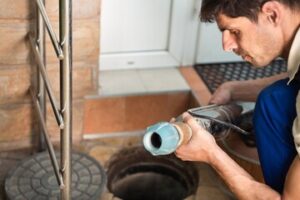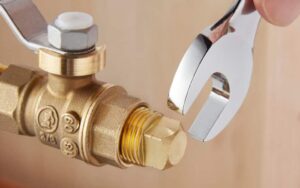Leaky pipes can cause a lot of problems in commercial properties. Understands that and works quickly to minimize damage and downtime.
They also know how to deal with a diverse range of businesses. From restaurants to hospitals, each has its own set of regulations that a commercial plumber must follow.

Whether you’re a plumber who works on residential or commercial properties, it’s important to specialize. This can impact the equipment you purchase, the training and licensing you pursue, and how you market your services. In the plumbing industry, specialization is key, as it allows you to work on the plumbing systems that most suit your skills and needs.
Generally speaking, residential plumbers focus on working on water pipes, bathroom systems, and other household plumbing components. They may be called out to perform preventive maintenance or respond to a sudden plumbing issue like a clogged drain or backed up sewer line. They usually communicate directly with the homeowner to ensure the plumbing problem is diagnosed and solved.
Specialized commercial plumbers are trained to work with larger plumbing systems in commercial properties, including hospitals, apartment complexes, and retail spaces. These systems are often more complex than those found in homes and require a higher level of knowledge to diagnose, repair, and maintain. These plumbers typically have to be able to work with building codes and health regulations in addition to repairing and installing pipework.
As a general rule, plumbing problems in commercial settings are more serious than those in residential spaces. This is because they tend to disrupt business operations and cause a loss of revenue. This is why it’s essential for commercial plumbers to offer emergency services. Ideally, the plumber can arrive on site at the same time as the owner to avoid any interruptions and minimize the effects of the plumbing issue.
When a residential plumber encounters a pesky drain clog, they can simply snake it out or send in a camera to get to the bottom of the issue. However, a commercial plumber must consider the entire plumbing system of their client’s property when they come across a similar issue. For instance, a clogged drain in a 20-story skyscraper can affect hundreds of people at once.
Aside from dealing with different types of plumbing issues, commercial plumbers are also responsible for a higher level of customer service. While residential plumbers are typically focused on communicating with homeowners to help educate them about the plumbing issue and their solution, commercial plumbers must often deal with a variety of customers in different spaces throughout the day.
When a homeowner calls in a plumber, they are usually looking to have problems like leaky faucets and clogged drains fixed. Commercial plumbers deal with much larger scale plumbing systems, and their repair work tends to be more complicated. They also have to be more familiar with different building codes that apply to specific businesses. For example, a hospital will have very different plumbing needs than an office building or shopping mall.
The types of plumbing fixtures used in each setting are also different. Commercial plumbing often deals with industrial-grade fixtures that are designed for high usage and to reduce the likelihood of breakdowns. These fixtures can be more expensive than residential fixtures, but they tend to last longer. Because of this, many companies will offer a warranty on their commercial plumbing products.
In addition to dealing with a wider range of plumbing issues, commercial plumbers must also be able to work more efficiently than their counterparts in the residential sector. This is because business owners are not as patient as homeowners when it comes to getting their plumbing issues fixed. This can make it challenging for a plumber to get the job done when time is of the essence.
While there are some stereotypes about plumbing being a “dirty” job, the truth is that it requires a lot of intelligence and skills to be successful as a plumber. This is especially true for commercial plumbers, who must be able to follow blueprints and install complex plumbing systems on a large scale. They must also be able to work well with others in a team and meet deadlines.
One final difference between residential and commercial plumbing is the type of plumbing fixtures that are used. While residential plumbing typically uses basic fixtures, commercial buildings will have more specialized ones, such as sprayers for vegetables or toilets that are designed to hold more water. Because of this, it is important for commercial plumbers to have a wide range of tools and knowledge so they can fix any problem that may arise. Also, because commercial buildings are often used by a lot of people, they need to have a system that can handle the demand.
Unlike residential plumbers, commercial plumbing professionals have the skills and experience to install, repair and maintain larger and more complex systems in buildings such as hotels, hospitals and restaurants. They are also familiar with the different codes and regulations that apply to commercial spaces. In addition, they have the tools and equipment required to deal with clogged drains, sewer backups and other issues that may arise in large commercial structures.
Whether you need to hire a commercial plumber or a residential plumber, make sure they have the right license. This will ensure that they are qualified to perform the necessary work and can fix problems quickly. Also, be sure to ask about their pricing structure. Some plumbers charge by the hour, while others will quote a flat rate for labor and parts.
The main difference between commercial and residential plumbing is the size of the plumbing system. Commercial properties have more outlets and water fixtures than homes, which requires a larger and more complex plumbing system. This includes hot and cold water systems, kitchens, bathrooms, toilets and urinals. It is also important for a commercial plumber to have good communication skills so they can communicate effectively with the clients and explain any issues that may arise.
In addition, a commercial plumber should be knowledgeable about the different types of fixtures and materials that are used in a particular setting. This will help them determine the best options for each situation and avoid costly mistakes. A commercial plumber should be able to handle large, high-pressure pipes and have the ability to install fixtures and appliances that are compatible with the plumbing system.
Finally, a commercial plumber should have a wide range of tools and equipment to handle the job. This will include basic carpentry tools to help them access hard-to-reach areas, such as inside walls. They should also be able to weld, solder and brace pipes. Additionally, they should be familiar with backflow testing technology and pipe relining.
A clogged drain in a commercial building can affect many people at once, so it is essential that the problem is fixed as soon as possible. It is also a good idea to have regular maintenance checks performed to prevent future problems. A reputable commercial plumber will be able to spot small leaks that might otherwise go unnoticed.
A commercial plumber needs a variety of different types of insurance to protect them from the risks of working in the industry. For example, general liability insurance is a common type of business coverage that can pay for damages caused by accidents on the job. It can also help cover legal fees and awards from nuisance lawsuits that may arise from faulty plumbing installations. Other types of coverage for plumbing professionals include products and completed operations insurance, which protects plumbers from claims that a product or installation they provided resulted in property damage. This is a crucial type of insurance for plumbers because it can provide protection from large losses that could threaten their business.
Another type of coverage that is important for plumbers to consider is workers’ compensation insurance, which helps pay for medical bills and lost wages if an employee is injured while on the job. It is typically required by law in many states. Some insurance companies offer a package policy that combines general liability, workers’ compensation, and commercial property insurance at a lower cost than buying the policies separately.
Most plumbers carry tools and equipment with them on the job, so having adequate coverage in case these items are stolen or damaged is essential. Some insurers provide a policy specifically designed for plumbing businesses that covers tools and equipment against theft, fire, vandalism, and other events. In addition, some policies have additional coverage features, such as business interruption insurance, which helps cover the costs of lost income if a loss forces your plumber to close for a period of time while repairs are made.
Other types of coverage for a commercial plumber might include business auto insurance, which provides protection in case you or one of your employees is involved in an accident while driving to and from a job site. Some insurers offer a package policy that bundles these and other key coverage types, such as professional liability insurance, at a lower cost than buying them individually. This can be an efficient way to get all the coverage your plumbing business needs in one convenient policy.

